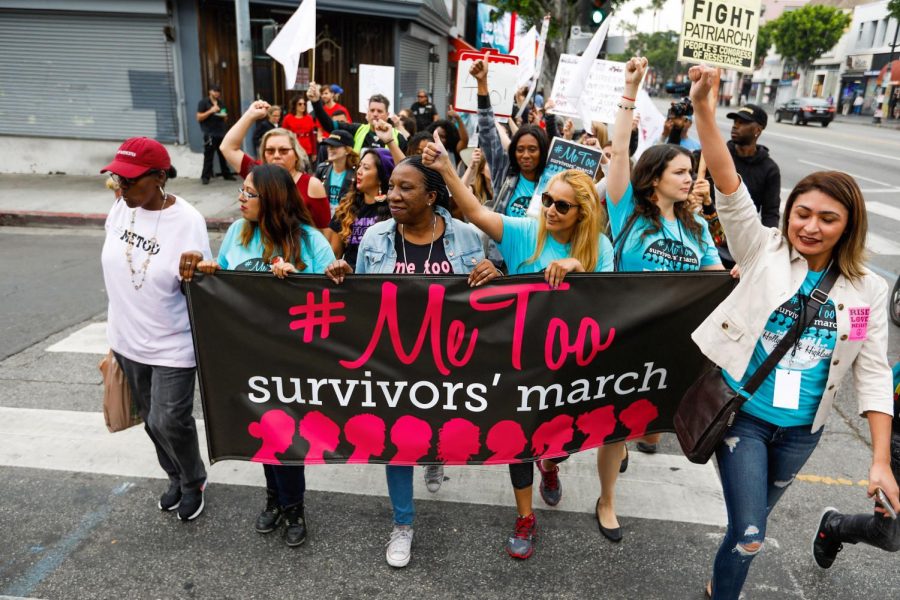The #MeToo movement needs to stay consistent
Photo Courtesy of Gary Coronado
Sexual assault survivors along with their supporters at the #MeToo Survivors March against sexual abuse Sunday, Nov. 12, 2017 in Los Angeles.
January 24, 2018
The #MeToo Movement has been having a big few months. From the whistleblowers who came forward during movement being named Time Magazine’s Person of the Year to the red carpet blackout of the Golden Globes, it has definitely gotten a lot of publicity in the media. However, the most important outcome by far is that high-powered industry officials like Harvey Weinstein, Kevin Spacey and Matt Lauer are finally being held accountable for their horrible actions.
While talking to my friends, I learned a lot of people haven’t been keeping up with the movement, so here is a brief overview of its last few months. It started in early October 2017 when the New York Times reported that dozens of women were accusing Harvey Weinstein, Hollywood movie producer, of decades of sexual harassment. Soon after, more women joined in the chorus of serious allegations against him.
Although he vehemently denied their claims, he immediately got fired from his own company, The Weinstein Company, and his wife of several years, Georgina Chapman, left him. This dethroning of a powerful Hollywood kingpin because of his sexual misconduct started a chain reaction.
The #MeToo movement was started by Tarana Burke in 2006 to raise awareness of just how many people actually had experiences of sexual harassment or assault in their life. Actress Alyssa Milano popularized it again on Twitter last October, and a half million people tweeted it within 24 hours.
From there, a revolution started. The incredibly inappropriate behavior of powerful men in many industries, not just in Hollywood, was being revealed and amazingly reprimanded.
Get The Daily Illini in your inbox!
Although the progress done thus far has been inspirational, many are worried that the movement is going too far. Recently, French actress Catherine Deneuve and more than 100 other french women in the entertainment industry denounced the #MeToo movement (and its counterpart #balancetonporc, which translates to “expose your pig”). She was worried that what started as a movement trying to hold rapists and serious sexual harassers accountable for their actions was diluted to complaining about any man that made you uncomfortable with his “clumsy flirting.” She argued that “stealing a kiss” shouldn’t be an act of career suicide.
When I first read the article in the New York Times, I was angry. The denouncers wrote, “(a)ccidents that can affect a woman’s body do not necessarily affect her dignity and must not, as hard as they can be, necessarily make her a perpetual victim because we are not reducible to our bodies.”
Although I agree that women are more than just their bodies, this is not allowance to touch or harass someone against their will. There is a spectrum of what is allowable human interaction, and there is a big difference between “clumsy flirting” and the rampant workplace sexual harassment to which the #MeToo movement has been bringing awareness. I was annoyed that people were trying to stop the progress of a movement that has been helping so many survivors in so many industries.
Then, the Aziz Ansari story came out.
For those who need a catch up, a woman’s recollection of her recent date with Aziz Ansari was published on babe.net. The 23-year old, who went by the pseudonym “Grace,” called her date with Ansari the “worst night of her life,” explaining that Ansari rushed straight through dinner, brought her back to his place and was more physical than she was comfortable with. However, instead of leaving straight away or vocalizing her discomfort strongly, she tried to hint that she was uncomfortable via her body language, but she still partook in some sexual activities. Finally, after more than an hour of this, she left, furious and crying to her girlfriends in her car ride back.
When I first read this, I wasn’t sure what to think. Although I think Ansari should have definitely paid more attention to her body language and ensured she was okay, it was also her responsibility to be direct and vocal if she did not like what was happening. Humiliation and a potentially ruined career over this admittedly extremely uncomfortable date, in my opinion, didn’t seem well-deserved.
Most of all, I wondered if I was being hypocritical. Here I was, angry at Deneuve for sugarcoating workplace sexual harassment as “clumsy flirting” but defending Ansari for misunderstandings on a bad date.
After reading other columns about it and watching videos defending or attacking Grace, I think I understand Deneuve’s issue with #MeToo a little bit more.
With the power to publicly ruin someone’s life, the crowd mentality of the movement could easily trample someone’s career over an honest misunderstanding. It’s dangerous when we haven’t drawn the line of what clearly is okay. What Aziz Ansari did was not even of comparable magnitude to Harvey Weinstein’s behavior, but it caused someone real discomfort nonetheless.
Generalizing them as one and giving the same level of punishment to both is not the answer. Where do we draw the line when someone’s actions are just a stupid mistake or a punishable offense? Honestly, I don’t know, but the future of #MeToo relies on society still listening to survivors on a case-by-case basis to raise both awareness and proper accountability for this ever-prevalent issue.
Shankari is a junior in LAS.







